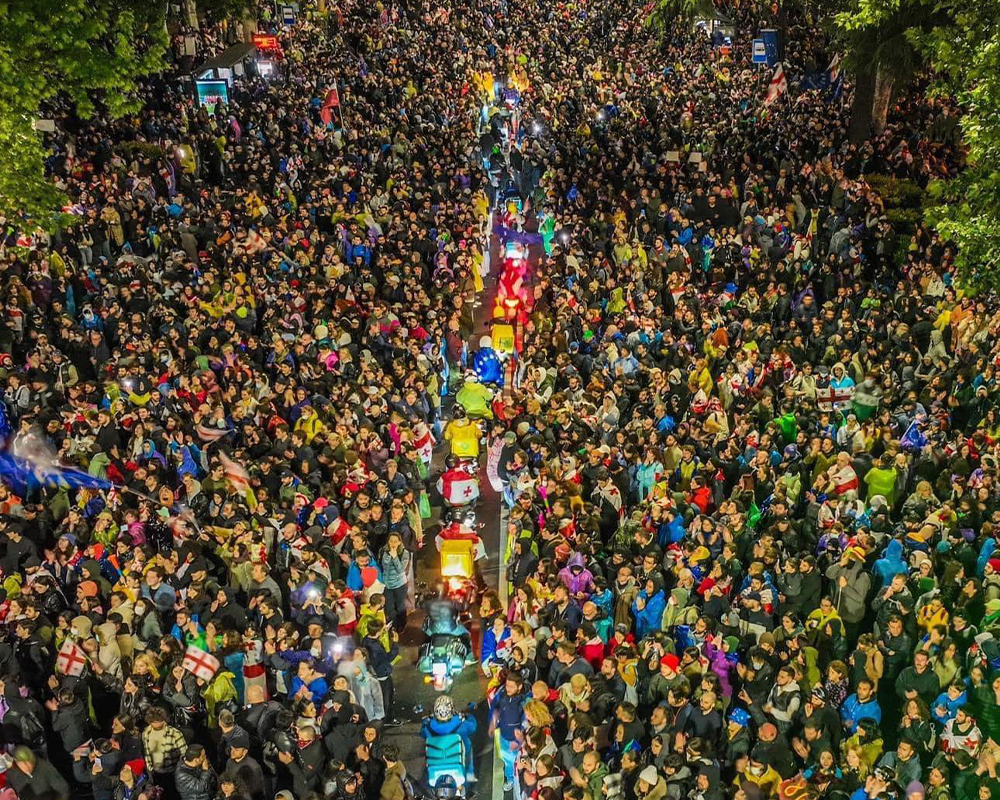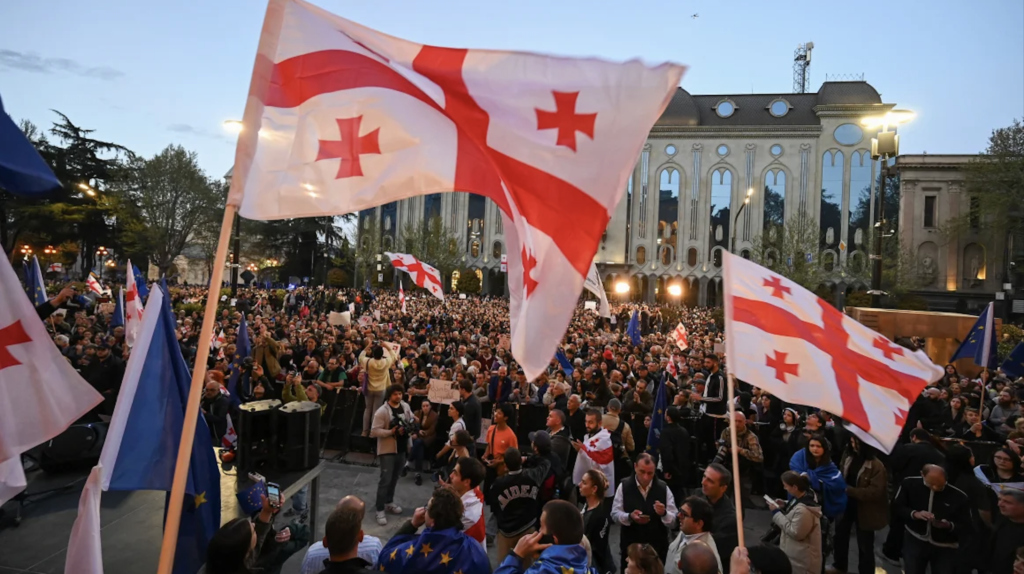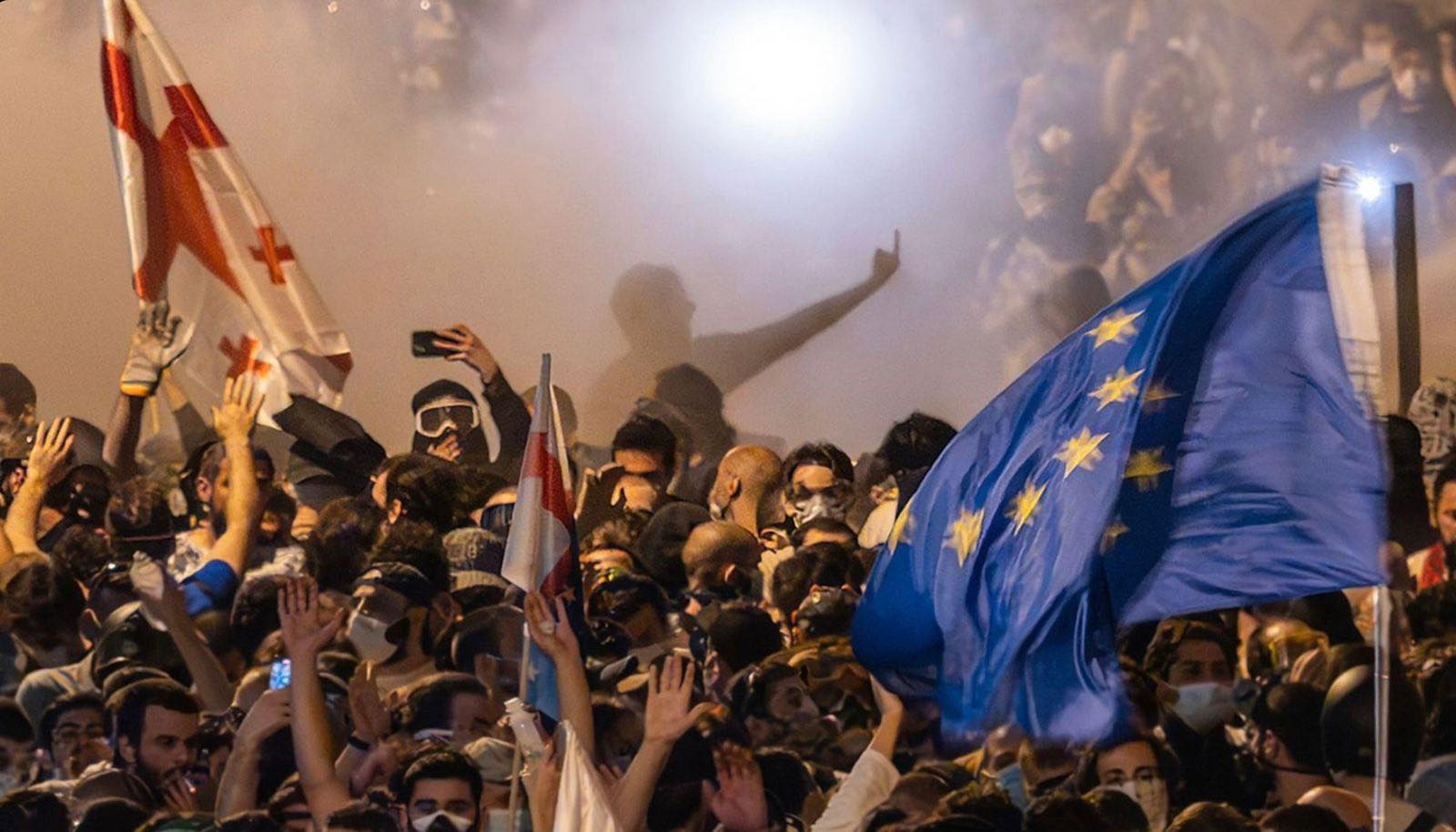I was wearing sandals. I was wearing sandals … and I was scared.
That’s why, when I had the chance to protest in front of the Georgian parliament one night in Tbilisi, I didn’t go. Because … What if I had to run?
Now, I’m regretting it. I think.
On Tuesday, May 14, 2024, 84 members of Georgia’s parliament voted to pass a bill that will require organizations that receive more than 20% of their funding from foreign sources to declare themselves as such. Only 30 members voted against it.
The terminology is a tell: As I learned from the safety of a hotel bar about a mile from the protests, a nearly identical bill was introduced in March of 2023. That one unabashedly bore the term “Foreign Agents” as part of its branding. But those words — foreign agents — in the Georgian and Russian languages conjured images of Cold War-era espionage. According to the people I talked to in Tbilisi, that fact helped rally protesters … and in 2023, the protests were successful. The ruling party not only withdrew the law but promised not to push it again.
Here in 2024, although the re-branded bill, with the softer terms “foreign influence” and “bearing the interests of a foreign power” fooled no one — least of all the protesters — the bill passed.
Georgia’s president has promised to veto the bill, but that veto will be overridden, and in the process, the Parliament “will authorize the Georgian government to surveil organizations promoting the ideas of freedom and democracy,” according to a Students For Liberty statement.
So now, I wish I had gone to the protests, when a handful of Students For Liberty local coordinators invited me, during LibertyCon Europe last month in Tbilisi. At least to see the protests, if nothing else.
And these were impressive, massive protests; some estimates had them above 100,000 people. That hotel bar I was at closed early — at 9:00 p.m. — in solidarity. Police tried to suppress the protests with violence — a cocktail of tear gas and pepper spray, along with beatings, unlawful detentions, and threats to family members — as the bill’s passage drew near.

It’s easy to see why so many people rallied against it: This bill will be used by Georgian politicians to silence critics, especially independent media, just as Russian politicians did after a similar bill passed there in 2012.
And, no doubt one Russian in particular is at the root of all this.
In 2008, Vladimir Putin gave the world a sense of his plans: The war he started with Georgia lasted only 16 days but resulted in Russian control of the previously Georgian regions of South Ossetia and Abkhazia, which comprise approximately 20% of Georgia’s internationally recognized territory.
That victory seems to have empowered Putin and the military he controls. We saw the evidence in 2014 with the annexation of Crimea, and then in 2022 with the invasion of Ukraine. And now, I can’t be the only one who’s worried we might look at this era of Russian aggression — an era that started with Georgia — the way we look back at The Anschluss: Hitler’s 1938 annexation of Austria.
Those aren’t the only global implications: The passage of the “foreign agents” bill will hurt Georgia’s chances at membership in the European Union, too.

As for me, well, my fear of protesting was justified. I learned that a Students For Liberty alumnus, Boris Chele Kurua, was violently assaulted by the pro-government forces near his residence. A few days later, two alumni of Georgian Students For Liberty were arrested while peacefully protesting. They were “dragged out of a crowd with violent force.”
In my sandals, if the tear gas and pepper spray and batons had come out, maybe I would have been arrested and beaten, too. I certainly wouldn’t have been able to outrun the cops. On the other hand, maybe I would have been at the right place, at the right time, to help another protester. I at least would be able to say I was a witness to this dark moment in history.
I don’t really know what to think.
What I do know is that, by the time I worked up the courage to wander past the Georgian Parliament during my visit in April, the sun was out. It was morning. No protesters were there, although the barricades were. I learned that the protesters usually started arriving in the evening.
And I know that eventually, no protesters will be there — day or night. That’s how these things usually go. As we’ve seen far too often, politicians can pass laws and have the police officers they control intimidate critics enough to withstand negative publicity for a while. Then, once the publicity and the rancor diminish, they get down to the dirty work of spying, inspecting, regulating, numbering, controlling, censoring, forbidding, robbing, stamping, registering, and all the other verbs Proudhon listed.
The Georgian people, however, have been steadily inching toward capitalism, markets, and freedom since the fall of the Berlin Wall. Here’s hoping they find more resolve for that progress than ever before. They’ll need it.
Are you a student interested in getting involved in pro-liberty activism? By applying to join Students For Liberty’s Local Coordinator Program, you can be supported in promoting the ideas of liberty while also developing your skills and meeting many like-minded students from across the world. Click on the button below to find out more and get involved!
This piece solely expresses the opinion of the author and not necessarily the organization as a whole. Students For Liberty is committed to facilitating a broad dialogue for liberty, representing a variety of opinions.



